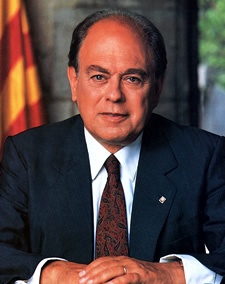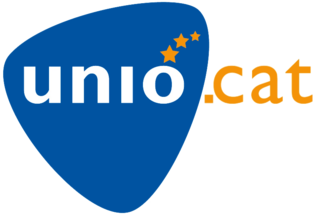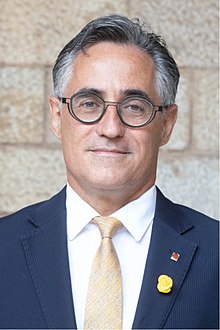
Catalonia is an autonomous community of Spain, designated as a nationality by its Statute of Autonomy. Most of its territory lies on the northeast of the Iberian Peninsula, to the south of the Pyrenees mountain range. Catalonia is administratively divided into four provinces or eight vegueries (regions), which are in turn divided into 42 comarques. The capital and largest city, Barcelona, is the second-most populous municipality in Spain and the fifth-most populous urban area in the European Union.

The recorded history of the lands of what today is known as Catalonia begins with the development of the Iberian peoples while several Greek colonies were established on the coast before the Roman conquest. It was the first area of Hispania conquered by the Romans. It then came under Visigothic rule after the collapse of the western part of the Roman Empire. In 718, the area was occupied by the Umayyad Caliphate and became a part of Muslim ruled al-Andalus. The Frankish Empire conquered northern half of the area from the Muslims, ending with the conquest of Barcelona in 801, as part of the creation of a larger buffer zone of Christian counties against Islamic rule historiographically known as the Marca Hispanica. In the 10th century the County of Barcelona became progressively independent from Frankish rule.
The Generalitat de Catalunya, or the Government of Catalonia, is the institutional system by which Catalonia is self-governed as an autonomous community of Spain. It is made up of the Parliament of Catalonia, the Presidency of the Generalitat de Catalunya, and the Executive Council of Catalonia. Its current powers are set out in the Statute of Autonomy of Catalonia of 2006.
The Republican Left of Catalonia is a pro-Catalan independence, social democratic political party in the Spanish autonomous community of Catalonia, with a presence also in Valencia, the Balearic Islands and the French department of Pyrénées-Orientales. It is also the main sponsor of the independence movement from France and Spain in the territories known as Catalan Countries, focusing in recent years on the creation of a Catalan Republic in Catalonia proper. Its current president is Oriol Junqueras and its secretary-general is Marta Rovira. The party is a member of the European Free Alliance.

Jordi Pujol i Soley is a retired Catalan politician who was the leader of the party Convergència Democràtica de Catalunya (CDC) from 1974 to 2003, and President of the Generalitat de Catalunya from 1980 to 2003.

Pasqual Maragall Mira is a Spanish retired politician and former President of Generalitat de Catalunya. He had previously been Mayor of Barcelona, from 1982 to 1997, and helped run the city's successful Olympic bid.

Convergence and Union was a Catalan nationalist electoral alliance in Catalonia, Spain. It was a federation of two constituent parties, the larger Democratic Convergence of Catalonia (CDC) and its smaller counterpart, the Democratic Union of Catalonia (UDC). It was dissolved on 18 June 2015.

The Democratic Convergence of Catalonia, frequently shortened as Convergence was a Catalan nationalist, liberal political party in Catalonia (Spain), currently still existing without any political activity.

The Democratic Union of Catalonia, frequently shortened as Union, was a regionalist, Christian-democratic political party in the Catalonia region of Spain existing between 1931 and 2017. Together with Democratic Convergence of Catalonia (CDC), they formed the Convergence and Union (CiU) alliance and federation from 1978 until its dissolution in 2015, under which they would rule the government of Catalonia for almost three decades during the recent Spanish democratic period.

Artur Mas i Gavarró is a Catalan politician. He was president of the Government of Catalonia from 2010 to 2015 and acting president from September 2015 to 12 January 2016.

The Catalan independence movement is a social and political movement which seeks the independence of Catalonia from Spain.
Pere Esteve i Abad was a Catalan Spanish politician, belonging to the political organisation Catalunya 2003, who became Deputy of Trade, Tourism and Consumer Affairs at the Catalan regional Government proposed by the Republican Left of Catalonia (ERC) party, with which he ran to the autonomic elections of the 2003. He resigned in October 2004 for health reasons.
The politics of Catalonia takes place within the framework of its Statute of Autonomy, which grants a degree of self-government to Catalonia and establish it as an autonomous community of Spain with the status of a nationality, operating as a parliamentary democracy. The Generalitat de Catalunya is the Catalan institution of self-government, which includes the Parliament of Catalonia, the President and the Executive Council. The Parliament of Catalonia is one of the oldest in the world.

The Parliament of Catalonia is the unicameral legislature of the autonomous community of Catalonia. The Parliament is currently made up of 135 members, known as deputies, who are elected for four-year terms or after extraordinary dissolution, chosen by universal suffrage in lists of four constituencies, corresponding to the Catalan provinces. The Parliament building is located in Ciutadella Park, Barcelona.
The Statute of Autonomy of Catalonia of 2006 provides Catalonia's basic institutional regulations under the Spanish Constitution of 1978. It defines the rights and obligations of the citizens of Catalonia, the political institutions of the Catalan community, their competences and relations with the rest of Spain, and the financing of the Government of Catalonia.

Francesc Homs Molist is a Spanish politician and former Minister of the Presidency and Spokesperson of the Government of Catalonia.

Antoni Comín i Oliveres is a Catalan intellectual and politician from Spain. He is currently the executive vice-president of the Council for the Republic and has been an MEP since July 2019. He is the fourth child of the politician and intellectual Alfonso Carlos Comín i Ros and Maria Lluïsa Oliveres i Sanvicens, whose other children are Maria, Pere and Betona. He is the partner of the stage designer Sergi Corbera, and they have a daughter called Laia.

Union of the Centre and Christian Democracy of Catalonia was an electoral coalition formed in Catalonia in December 1976 to contest the Spanish Congress of Deputies election of 1977, the first democratic election to be held in Spain since the Second Spanish Republic. It was formed by the Catalan Centre (CC) and the historic Democratic Union of Catalonia (UDC), and came to be supported by the Christian Democratic Team of the Spanish State, which did not run on its own in Catalonia. The coalition was officially registered on 3 May 1977. The alliance dissolved shortly after the election upon the start of the newly elected parliament, with UDC deputy Antón Cañellas joining the Catalan–Basque Group and Carlos Güell going into the Mixed Group.

The Statute of Autonomy of Catalonia of 1932, also called the Statute of Núria, was the first implemented statute of autonomy for Catalonia, officially providing self-government to Catalonia for the first time in more than 200 years. The Statute was promoted by the then acting President of the Generalitat, Francesc Macià and approved in a referendum by 99% of Catalan voters. The draft Statute was completed on 20 June 1931 in Núria and finally approved in the Spanish Parliament on 9 September 1932. It was implemented until the occupation of Catalonia by the Nationalist Army during the last stages of the Spanish Civil War, in 1939.

Francesc de Paula Gambús i Millet was a Spanish politician who served as a Member of the European Parliament.
















